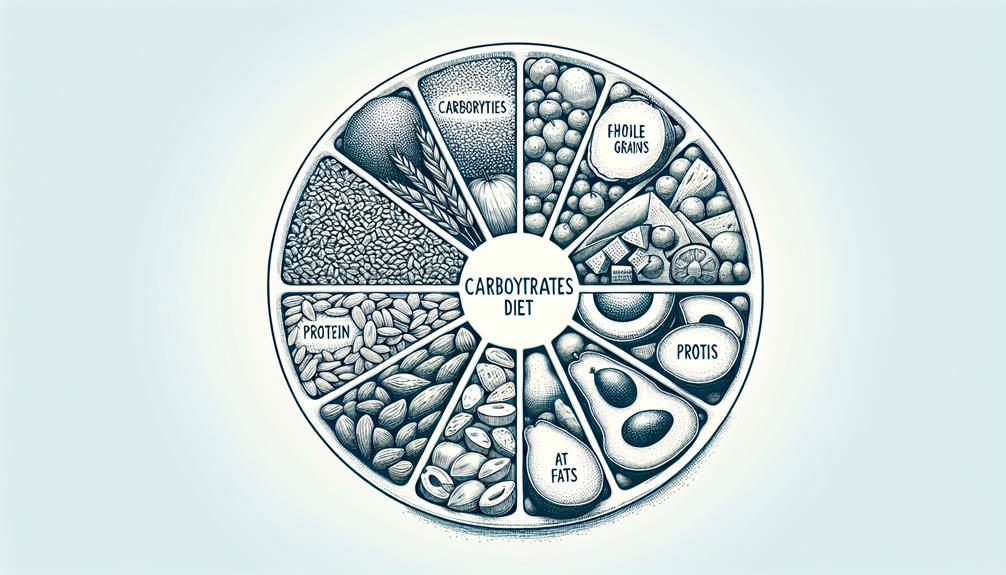Macronutrient Calculator
Just like a skilled chef carefully balances flavors in a dish, understanding how to balance your macronutrients is key to a healthy diet. But how do you know if you're getting the right mix of proteins, fats, and carbs? A Macronutrient Calculator can be your guiding tool in navigating this nutritional puzzle. By inputting your personal details and activity levels, this calculator can help you determine the optimal ratios for your macronutrient intake. So, are you ready to unlock the secrets of a well-balanced diet that suits your unique needs and goals?
Key Takeaways
- Macronutrient balance is essential for nutrient absorption and bodily functions.
- Customizing ratios aligns your diet with specific goals like muscle building or weight loss.
- Tracking intake helps assess effectiveness and make gradual adjustments for optimal results.
- Meal timing, especially pre- and post-workout, is crucial for performance, recovery, and muscle repair.
Importance of Macronutrient Balance
Understanding the significance of maintaining a balanced intake of macronutrients is crucial for optimizing your overall health and well-being. Nutrient absorption is a key aspect influenced by the balance of macronutrients in your diet. Proteins, fats, and carbohydrates play unique roles in the digestive process, with each macronutrient requiring specific enzymes and conditions for proper breakdown and absorption. For example, proteins are broken down into amino acids, essential for various bodily functions like muscle building and immune support. Fats are vital for absorbing fat-soluble vitamins and maintaining cell structure. Carbohydrates provide a primary energy source for your body and brain.
Moreover, the balance of macronutrients also affects metabolic health. Carbohydrates, when consumed in excess, can lead to spikes in blood sugar levels, potentially contributing to insulin resistance and weight gain. On the other hand, adequate protein intake can support muscle maintenance and metabolic function. Balancing macronutrients ensures that your body receives the necessary nutrients for optimal health and functioning.
How a Macronutrient Calculator Works
To determine your optimal macronutrient intake, a macronutrient calculator uses specific formulas based on your individual factors such as age, weight, activity level, and health goals. Understanding calculations is crucial for calculating accuracy. Here's how a macronutrient calculator works:
- Data Input: You provide details like age, weight, height, activity level, and goals.
- Algorithm Analysis: The calculator processes this data through established formulas.
- Macronutrient Distribution: Based on the analysis, it determines your ideal macronutrient ratios.
- Adjustments: You may need to fine-tune the results based on personal preferences or health considerations.
Customizing Your Macronutrient Ratios

Customizing your macronutrient ratios can help tailor your diet to better suit your individual needs and goals. When it comes to meal planning, adjusting your macronutrient ratios can make a significant difference in achieving your desired outcomes. For instance, if you have specific fitness goals such as building muscle or losing weight, customizing your macronutrient ratios can optimize your results.
To customize your macronutrient ratios effectively, it's essential to understand the role each macronutrient plays in your diet. Proteins are crucial for muscle repair and growth, while carbohydrates provide energy for your workouts. Healthy fats support hormone production and overall health. By adjusting the proportions of these macronutrients in your diet, you can fine-tune your nutrition to meet your unique requirements.
Whether you're aiming to enhance your athletic performance, improve your body composition, or simply lead a healthier lifestyle, customizing your macronutrient ratios through informed meal planning can be a game-changer in reaching your fitness goals.
Tracking and Adjusting Your Intake
Adjusting your macronutrient intake based on your progress is key to optimizing your nutrition plan for achieving your fitness goals. Tracking your progress allows you to make informed decisions about whether to increase or decrease certain macros to better align with your objectives. Here are four important points to consider when adjusting your macros and tracking progress:
- Consistent Monitoring: Regularly track your food intake and monitor changes in your body composition to assess how well your current macronutrient ratios are working for you.
- Goal Alignment: Ensure that your macronutrient adjustments are in line with your specific fitness goals, whether it be muscle gain, fat loss, or improved athletic performance.
- Gradual Changes: Make small, incremental adjustments to your macros rather than drastic changes to allow your body to adapt and respond effectively.
- Professional Guidance: Consider consulting with a nutritionist or dietitian to help you analyze your progress and make informed decisions about adjusting your macronutrient intake for optimal results.
Maximizing Results With Macronutrient Planning

When optimizing your nutrition plan for achieving your fitness goals, maximizing results with macronutrient planning involves strategic alignment of your intake with your specific objectives. Meal timing plays a crucial role in maximizing your results. Consuming the right balance of macronutrients before and after your workout can enhance performance and aid in recovery. For example, consuming a meal rich in carbohydrates and protein about 2-3 hours before exercise can provide the necessary energy and nutrients to fuel your workout. Similarly, consuming a post-workout meal rich in protein and carbohydrates within 30 minutes to an hour after exercise can help replenish glycogen stores and support muscle repair and growth.
In addition to meal timing, your exercise routine should also dictate your macronutrient intake. On days when you engage in intense physical activity, adjusting your carbohydrate intake to fuel your workouts and support recovery is essential. Conversely, on rest days, focusing on adequate protein intake to support muscle maintenance and repair is key. By aligning your macronutrient intake with your meal timing and exercise routine, you can maximize your results and progress towards your fitness goals efficiently.
Frequently Asked Questions
Can a Macronutrient Calculator Account for Individual Food Preferences and Restrictions, Such as Vegetarian or Gluten-Free Diets?
When looking for a macronutrient calculator, ensure it accommodates your food preferences and restrictions like vegetarian or gluten-free diets. Look for features that suggest suitable vegetarian alternatives and gluten-free options to meet your dietary needs.
How Often Should I Recalculate My Macronutrient Ratios, Especially if My Activity Level or Weight Changes?
When your weight or activity levels shift, reassess your macronutrient ratios. Regularly recalculating ensures dietary adjustments align with your needs. Embrace these updates like a sailor adjusting sails to navigate changing seas.
Are There Specific Macronutrient Ratios Recommended for Different Fitness Goals, Such as Muscle Gain or Weight Loss?
For different fitness goals like muscle gain or weight loss, specific macronutrient ratios matter. Macronutrient timing impacts effectiveness, while distribution affects results. Tailoring ratios to your goals and adjusting as needed optimizes your progress.
How Can I Ensure I Am Getting Enough Micronutrients While Focusing on Macronutrient Balance?
To ensure you're getting enough micronutrients while focusing on macronutrient balance, consider incorporating micronutrient supplements into your routine. Additionally, plan balanced meals rich in a variety of fruits, vegetables, whole grains, lean proteins, and healthy fats for optimal nutrition.
Is There a Recommended Timing for Consuming Macronutrients Throughout the Day to Optimize Energy Levels and Performance?
For optimal timing of macronutrient consumption to boost energy levels and performance, focus on balanced meals/snacks every 3-4 hours. Start the day with a protein-rich breakfast, include carbs pre/post-workout, and end with a balanced dinner.
Conclusion
By utilizing a macronutrient calculator to balance your diet, you can optimize your nutrition intake for better health and performance. Tracking and adjusting your intake based on your customized ratios will help you achieve your fitness goals more effectively. With proper macronutrient planning, you can maximize your results and ensure that you are fueling your body with the right nutrients for success. Start using a macronutrient calculator today to take control of your diet and reach your full potential.












